高中英语 Module3 period 4 Grammar 1, Grammar 2教案 必修3 新
人教高中英语必修3Unit4Grammar (共33张PPT)

Task 1
找出文中的主语从句.
What it was to become was uncertain until between 4.5 and 3.8 billion years ago.
What is even more important is that as the earth cooled down, water began to appear on its surface.
and object clauses.
As long as you love me
• Although loneliness has always been a friend of mine I'm leaving my life in your hands
People say ①I'm crazy and that I am blind
what 在从句中充当句子成分,如主语、宾语、 表语,而that 则不然。
1)_W__h_a_t you said yesterday is right.
2) Th_a_t__ she is still alive is a consolation.
找出主语从句。
• Who will go makes no difference. • Which is the best is not certain. • Why dinosaurs died out is still unknown. • When we will get together has not been
A. When will we B. When we will C. What will we D. What we will
人教高中英语必修3Unit4Grammar共28张
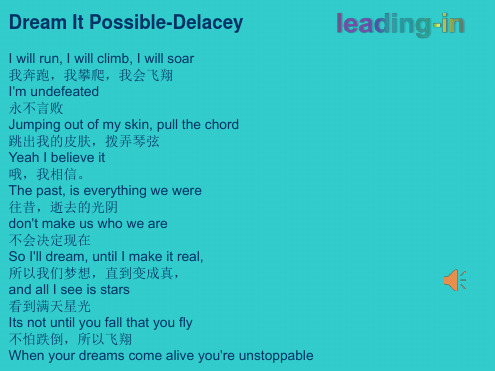
2.主语从句后置!
为了避免主语冗长 ,句子头重脚轻 ,经常用it 作 形式主语 ,主语从句放在后面作真正的主语 .
例:
That we shall be late is certain. -- It ' s certain that we shall be late.
1. That the earth is round is known to all.
(obvious, true,natural,surprising,necessary,important, possible, likely, certain, probable, etc.)
It is necessary that… It is important that …. It is obvious that……
二 主语从句的位置: 1.通常放在主句谓语动词之前
That she left him hurts him so much .
That I can enter a key university is my dream.
Whether we ' ll go camping tomorrow depends on the weather
Every life is a boat, the dream is the boat sail. 每个人的生命都是一只小船,梦想是小船的风帆。 Your future depends on your dreams. 你的梦想决定着你的未来
Your dream?
Don't let your dreams just be dreams. 别让你的梦想只是梦想。 It is worth fighting for it 值得为之拼搏 To accomplish your dream,you must act. 要想成就梦想,必须行动。
人教版高中英语必修三Unit3Grammar教案全面版
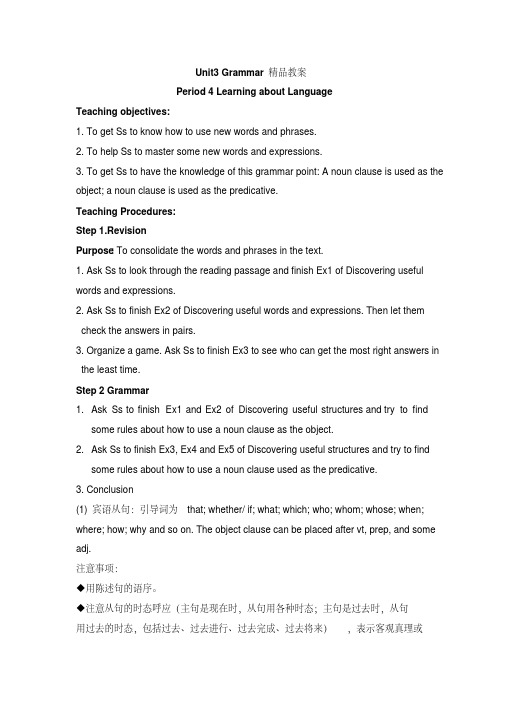
Unit3 Grammar精品教案Period 4 Learning about LanguageTeaching objectives:1. To get Ss to know how to use new words and phrases.2. To help Ss to master some new words and expressions.3. To get Ss to have the knowledge of this grammar point: A noun clause is used as the object; a noun clause is used as the predicative.Teaching Procedures:Step 1.RevisionPurpose: To consolidate the words and phrases in the text.1. Ask Ss to look through the reading passage and finish Ex1 of Discovering useful words and expressions.2. Ask Ss to finish Ex2 of Discovering useful words and expressions. Then let them check the answers in pairs.3. Organize a game. Ask Ss to finish Ex3 to see who can get the most right answers in the least time.Step 2. Grammar1.Ask Ss to finish Ex1 and Ex2 of Discovering useful structures and try to findsome rules about how to use a noun clause as the object.2.Ask Ss to finish Ex3, Ex4 and Ex5 of Discovering useful structures and try to findsome rules about how to use a noun clause used as the predicative.3. Conclusion(1) 宾语从句:引导词为that; whether/ if; what; which; who; whom; whose; when; where; how; why and so on. The object clause can be placed after vt, prep, and some adj.注意事项:◆用陈述句的语序。
高中英语 unit3 travel Period4 Grammar教案 新人教版必修1
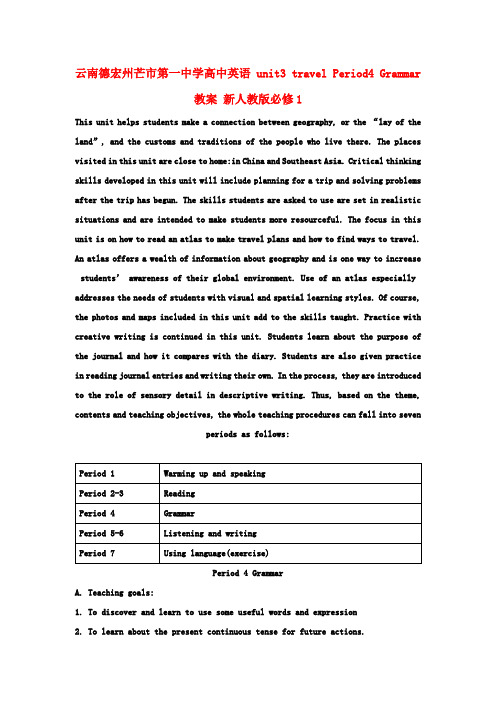
云南德宏州芒市第一中学高中英语 unit3 travel Period4 Grammar教案新人教版必修1This unit helps students make a connection between geography, or the “lay of the land”, and the customs and traditions of the people who live there. The places visited in this unit are close to home:in China and Southeast Asia. Critical thinking skills developed in this unit will include planning for a trip and solving problems after the trip has begun. The skills students are asked to use are set in realistic situations and are intended to make students more resourceful. The focus in this unit is on how to read an atlas to make travel plans and how to find ways to travel. An atlas offers a wealth of information about geography and is one way to increase students’ awareness of their global environment. U se of an atlas especially addresses the needs of students with visual and spatial learning styles. Of course, the photos and maps included in this unit add to the skills taught. Practice with creative writing is continued in this unit. Students learn about the purpose of the journal and how it compares with the diary. Students are also given practice in reading journal entries and writing their own. In the process, they are introduced to the role of sensory detail in descriptive writing. Thus, based on the theme, contents and teaching objectives, the whole teaching procedures can fall into sevenperiods as follows:Period 1 Warming up and speakingPeriod 2-3 ReadingPeriod 4 GrammarPeriod 5-6 Listening and writingPeriod 7 Using language(exercise)Period 4 GrammarA. Teaching goals:1. To discover and learn to use some useful words and expression2. To learn about the present continuous tense for future actions.B. Teaching important points:the present tense for future use.C. Predicting problems and analysis1. The teacher should make a good preparation for the pre-class to help our students understand the concept and category better. Because of their poor basis, they may not be familiar with some words, phrases, sentences, definition and so on.2. The teacher should introduce some skills properly so that it enables studentswork out many questions of this grammar learning.3. The teacher must pay more attention to students’ feedback in the class and timely adjust..D. Teaching Methods1. Review, explanation, and consolidation.2. Make every student work in class.3. Task-Based Teaching Method and Group Cooperation.E. Teaching AidsThe multimedia; The blackboard; The coursewareF. Teaching proceduresPre-class-----lead-in-----exercise-----presentation-----Post-class-----consoli dation----homeworkStep1. Lead-in and revision1.Give them a few sentences to translate into Chinese and ask them to pay attention to its tense form.1. Look! What are they doing?______看!他们正在做什么?________________2. She is swimming now._____她正在游泳。
高中英语 Unit 3 第四学时 Grammar课件 新人教版必修4

第一页,共15页。
第四学时(xuéshí) Grammar
第二页,共15页。
第三页,共15页。
语法 精讲
动词ing形式(xíngshì)作表语、定语和宾语补足语
第四页,共15页。
语法
精 讲 一、动词(dòngcí)ing形式作表语
1.动词ing作表语时放在系动词之后,表示抽象的一般性的 行为,用来说明主语的内容,与主语通常是同一概念,表语和主 语常可互换位置。
2.While she was getting me ____ (settle) into a tiny but clean room...
解析:因句中已有谓语was getting,所以settle为非谓语 动词;由句中结构可知,此非谓语动词作宾补;根据 (gēnjù)settle sb.into...,可见me与settle是被动关系, 故用ed形式,即用settled作宾补。
答案: settledng you English. =Teaching you English is my job. 我的工作(gōngzuò)是教你们英语。 My favorite sport is swimming. =Swimming is my favorite sport. 我最喜欢的运动是游泳。
第十三页,共15页。
语法 精讲
解析:因句中已有谓语can help,可见learn为非谓语动词; 由句子结构可知非谓语动词短语应当是作主语Lessons 的定语;因Lessons与learn是被动(bèidòng)关系,故用ed形式learned。
答案: learned
第十四页,共15页。
语法
精讲
语法 精讲
高中英语必修3-unit4-Grammar知识讲解
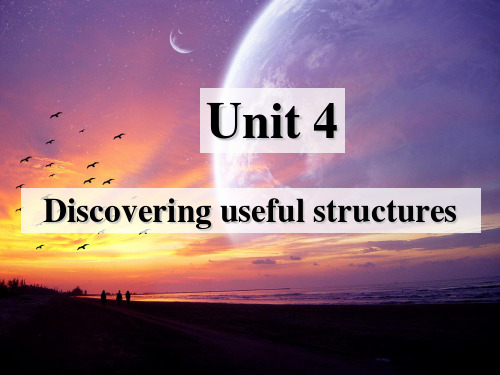
Discovering useful structures
Noun clauses as the subject
What does the underlined part serve as in each sentence?
1. Beijing is our capital. 2. You are a student.
主语从句用陈述语序 关联词位于句首, 不能省略
How he became a great scientist is known to us all. Who the watch belongs to is unknown. That he finished writing the composition in such a short time surprised us all.
subject
3. Smoking is bad for you. 4. To find your way can be a problem. 5. “How do you do?” is a greeting.
6. It is certain that we shall be late.
Read the sentences from the text and pay attention to the underlined parts.
• 为了避免头重脚轻,常用it作形式主语, 而 把真正主语放在句子末尾。
How the book will sell depends on its author.
That he is the best student in the class is obvious.
= It is obvious that he is the best student in the class.
高中英语人教版必修3 Unit4Grammar
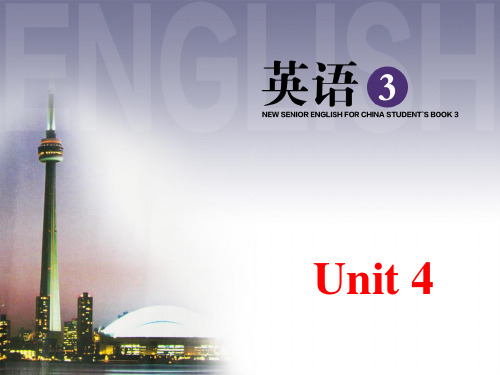
2. That Jay Zhou will come to my city
excites everybody. 该句中主语从句是 _T_h_a_t_J_a_y__Z_h_o_u__w_i_ll_ _c_o_m_e__to__m_y__c_it_y_,引导词为__th_a_t_。 3. Whether we will travel abroad or not
What it was to become was uncertain until between 4.5 and 3.8 billion years ago… …it was not clear whether the shape would last or not. 通过观察,我们发现两句当中划线部分 的句子都在复合句中起名词的作用,因 此称之为主语从句。
2. whether与if引导主语从句 如果主语从句置于句首,不能用if
引导,此时,需用whether。但如果用 it作形式主语,而把主语从句放在句末 时,也可以用if引导。
【巩固练习】 用whether或if填空。 (1) It doesn’t matter _w_h_e_t_h_e_r_/_i_f_ he will come or not. (2) _W__h_e_th__er_ we’ll go camping tomorrow depends on the weather. (3) It was doubtful _w_h_e_t_h_e_r_/_i_f_ Tom really saw Sharon. (4) _W__h_e_th__er_ Tom really saw Sharon was doubtful.
高中英语Unit 3 Period 4 Grammar and usage
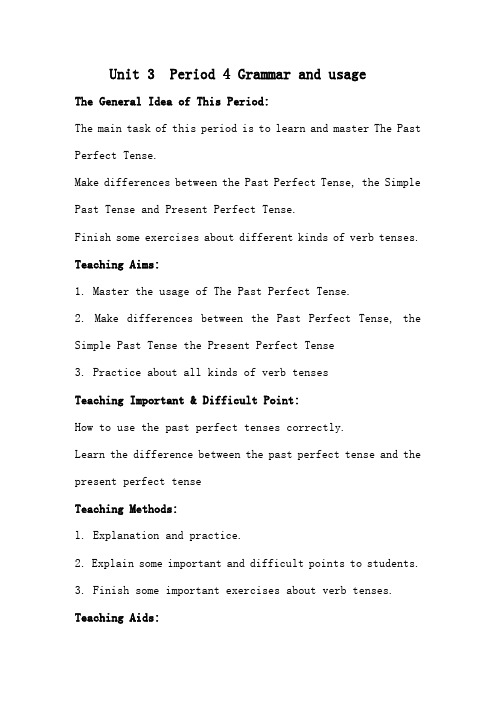
Unit 3 Period 4 Grammar and usageThe General Idea of This Period:The main task of this period is to learn and master The Past Perfect Tense.Make differences between the Past Perfect Tense, the Simple Past Tense and Present Perfect Tense.Finish some exercises about different kinds of verb tenses. Teaching Aims:1. Master the usage of The Past Perfect Tense.2. Make differences between the Past Perfect Tense, the Simple Past Tense the Present Perfect Tense3. Practice about all kinds of verb tensesTeaching Important & Difficult Point:How to use the past perfect tenses correctly.Learn the difference between the past perfect tense and the present perfect tenseTeaching Methods:l. Explanation and practice.2. Explain some important and difficult points to students.3. Finish some important exercises about verb tenses. Teaching Aids:1. the multimedia2. the blackboardTeaching Procedures:Step 1 greetingsGreet the students as usualCheck the homeworkStep 2 lead- inWrite some sentences on the blackboard and lead the students to Then show some sentences and lead the students to recognize situations where the past perfect tense is used as well as what time expressions can be used together with the tense. Also, they will see how the tense is formed and know the difference between the past perfect tense and the simple past tense.T: Look at the sentences on the Bb. What can you find the common points of these sentences are?(Show the following on the blackboard)◆ Upon entering the tomb, Carter's lucky pet bird, which hadled him to the place, was eaten by a snake.◆ "We emptied the tomb of everything it contained,'' said Carter.Carter said that they had emptied the tomb of everything it contained.S: They all include the past perfect tense.T: Good! We form the past perfect tense by using "had" and the "verb-ed" form. I will show youwhy and when we use the past perfect tense. Please look at the sentences on the Bb. We cansee from the first sentence: Carter's lucky pet bird led Carter to the site, and then it was eaten by a snake. We use the simple past tense to talk about a past action. When we want to talk about something that happened at an earlier time in the past, we use the past perfect tense. We can find more examples. Such as, The tickets had been sold out when we arrived at the theatre. It means the tickets were sold out before we arrived at the theatre. Do you know why we use the past perfect tense in the second example?S: I think it's because we've change the sentence from the direct speech into the reported speech.And "said”is used in the main clause, so we must change the simple past tense to the past perfect tense.T: Quite right! We can use the past perfect tense in reportedspeech to refer to an action that had already happened at the time of speaking. We can change the simple past tense and present perfect tense in the direct speech to the past perfect tense in the reported speech. Now read the following two examples.1. I had done my homework this morning before I went to the museum.2. Then a few months after Carter had opened the tomb, Lord Carnarvon fell ill with a fever and died.T: As we can see in the first example, the use of the past perfect tense simply indicates that an action comes before another past action. It does not mean that the past action happened a long time ago. And we often use the past perfect tense with time expressions such as when, after, before, as soon as, until, since, by, for and already.(Show more sentences and ask them to join the pairs of sentences using the past perfect tense so that students can understand the past perfect tense better.)T: Look at these sentences. Join these pairs of sentences using the past perfect tense. You can add words if needed.1. I enjoyed the play very much. I saw it once before.2. I looked for my friends at the end of the play. They left.3. We got to the restaurant. It closed.Suggested answers:1. I enjoyed the play very much, although I had seen it once before.2.I looked for my friends, but they had left.3. When we got to the theatre, it had closed.Step 3 PracticeStudents will read two stories and complete them using the correct verb forms.T: Please turn to page 49. The following are the notes of Amelia Earhart. Who was AmeliaEarhart? What happened to her? Read the notes and then answer the two questions.S1: She is a female pilot from America and the first woman passenger to fly across the Atlantic and later, she became the first woman to fly across the Atlantic. But she went missing on her round- the-world flight.T: OK. Please complete the story of her life after reading the notes.(Ask the students to read and complete the story. After theyfinish it, check the answers in class.)T: Have you watched the film "Titanic"?S2: Yes.T: Great! Now here is an article "The Titanic". Please read and complete it. Use the simple pastor the past perfect tense. Turn to page 48 if you need help.(A few minutes later, check the answers.)Step 4 Present perfect or past perfectStudents will learn when to use the present perfect tense and when to use the past perfect tense. Get the students to read the four pictures with the sentences in the direct speech to review where the present perfect should be used. Then ask the students to complete an article using the past perfect tense by changing the sentences into the indirect speech.T: Please read this sentence and the diagram. Can you tell us when we use the present perfect tense?We have received more than ten letters from him by now. We received his letters.→_____│__________________________│_________ FuturePast PresentT: Any volunteer to answer my question?S1: Let me have a try. I think the present perfect tense isused when we are talking about a pastevent which relates to the present time.T: Well done! Who can explain the sentence below by drawinga diagram?We had received five letters from him by the end of last year.S2: I will draw it on the Bb.PresentPast │ │ │We received his letter the end oflast yearT: Can you tell us when we use the past perfect tense?S: The past perfect tense is used when we are discussing thepast event and want to talk about an even earlier event.T: Besides, when we change a sentence from the direct speechinto the indirect speech, the past tense, the presentperfect tense should be changed into the past perfecttense.T: Look at the four pictures. What story do they tell US?S: I think this man is Cai Lun. The pictures are about how he invented paper, and how people inthe west knew the way.T: Good. The sentences in the pictures are in the direct speech. Now you will complete the article. You will change these sentences into the indirect speech. Pay attention to the tense.(After the students finish the exercise, check their answers) Step 5 HomeworkFinish the exercises C1, C2 and D2 on page 104 and 105 in Workbook.Refer to some grammar books to more about the tense.。
人教高中英语必修3Unit4 Grammar(共22张PPT)
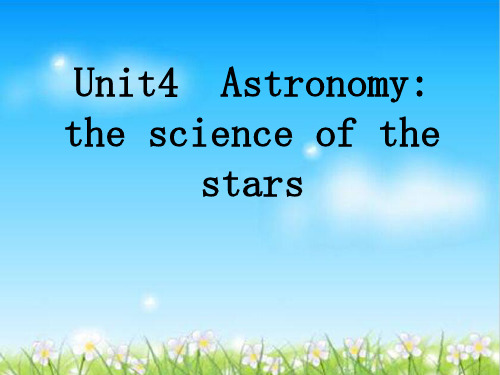
stars
Step 1 Lead-in(课堂导
入)
(Robbing game)
名词性从句
Noun clause
主语从句 Subject Clause
宾语从句 名词性从句 Ob表je语ct从Cl句ause Noun clause
1) That the old building was rebuilt is right. That he is the best student in the class is obvious. It is obvious that he is the best student in the class.
fishing. 4. This is because y表ou语d从id句n’t finish the
job.
5. This place is where表I语pu从t m句y bag yesterday.
6. What主is语do从n句e by night appears by day.
Step 3 Exploring question (问题探究)
6.( ____ the earth is becoming warm) is a good
topic for research. 7.( ___ the sun is rises in the east ) is known to us all. 8...
Step 5 Presentations. (展示解疑)
1.( _____ is needed for success) is your hard work. 2.( ___ they will arrive )has been told to the teacher. 3. It is not clear (___we will go shopping tomorrow.) 4.( ______ can join in the sport meet) is decided by the teacher. 5.( ____ it will rain or not) is not clear.
高中英语Unit 3 Period 4 Grammar and usage教案
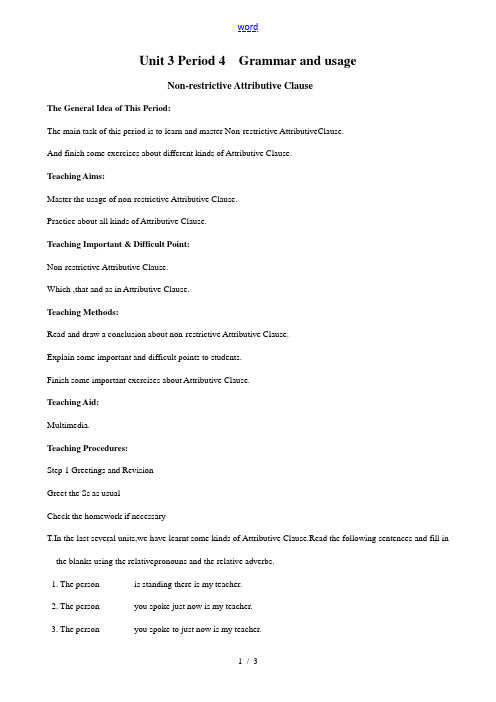
Unit 3 Period 4 Grammar and usageNon-restrictive Attributive ClauseThe General Idea of This Period:The main task of this period is to learn and master Non-restrictive AttributiveClause.And finish some exercises about different kinds of Attributive Clause.Teaching Aims:Master the usage of non-restrictive Attributive Clause.Practice about all kinds of Attributive Clause.Teaching Important & Difficult Point:Non-restrictive Attributive Clause.Which ,that and as in Attributive Clause.Teaching Methods:Read and draw a conclusion about non-restrictive Attributive Clause.Explain some important and difficult points to students.Finish some important exercises about Attributive Clause.Teaching Aid:Multimedia.Teaching Procedures:Step 1 Greetings and RevisionGreet the Ss as usualCheck the homework if necessaryT.In the last several units,we have learnt some kinds of Attributive Clause.Read the following sentences and fill in the blanks using the relativepronouns and the relative adverbs.1. The person _______ is standing there is my teacher.2. The person _______ you spoke just now is my teacher.3. The person _______ you spoke to just now is my teacher.4. I bought a car _____ cost little.5. The car _______ I bought yesterday cost little.6. This school is the one _______ I studied ten years ago.7. This is the little girl _________ parents were killed in the earthquake.8. The boss _________ pany my father worked is a very kind man.9. I will remember that day _______ I first came to Beijing.10. There are several reasons ________ we can’t do that.Give Ss several minutes to finish them, then check the answers.Suggested answers:1. who/that2. to whom3. who/whom/that4. which/that5. which/that6. in which/where7. whose8. whose9. when/on which10. why/for whichT:Now,let's learn another kind of Non-restrictive Attributive ClauseStep 3 Non-restrictive Attributive ClauseT: Let's look at some examples. Can you find some differences between theNon-restrictive Attributive Clause and the Restrictive Attributive Clause?Examples: Amy, who took weight-loss pills, now realizes that health isimportant.My pills are in the bathroom,where I always keep them.My cousin,whose body is slim, still wants to lose some weight.We will put off the outing until next month,when Amy feels better.T:Who can answer this question?S1 :There is a ma before the Non-Restrictive Attributive Clause.S2 :The Non-restrictive Attributive Clause can be left outS3 :We can't use "that" in this kind of sentence.T: OK,not bad. And we can't miss the relative words, either.Let's look at some examples:T:What can you learn from the sentences?Ss:We can use which to refer to the whole main clause.T: OK, and we can't use "that". Other examples.T:We can find a new kind of Attributive Clause.We can use most/all/some/both/part/of + whom/which to express a plete or partial quantity. Step4PracticeLet's finish the given exercises on Pages 48-49.(check the answers )Step 5 HomeworkDo some consolidation exercise。
人教高中英语必修3Unit4Grammar (共33张PPT)
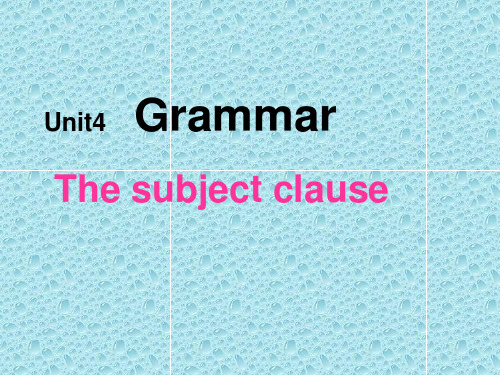
Summary:
Subject Clause
1. 用 that / whether / if/ /where / how / when /why / who /what/which/ how much / etc. 来连接主语从句. 2.That 在主语从句中不能省略.
3.引导主语从句在句首只能用whether,有it 作形式主语的whether/if都可以. 4.有时为了使句子结构平衡, 避免 “头重脚 轻”,常用 it 作形式主语,而把从句放在后 面.4种句型。 5.主语从句作主语时,谓语动词一般用单数 形式。
the exam.
2) It is + adj. +that It’s certain that… 肯定… It is possible/likely that... 很可能 It is obvious/clear that… 很明显… It is true that…的确…
It is necessary \important \natural\... that…
Continue to look at note 1
That he will win the match is certain. It is certain that he will win the match. 注解:一般来说主语从句都是放在句首 , 但有时为了使句子 保持平衡,避免”头重脚轻”,
6)主语从句中用陈述语序,
7)“what”引导主语从句时,谓语动词: 常与其后的名词作表语一致 ,且根据句子的语境而定。
eg: 1. What you left are only several old books. 2. What you said is of great importance.
高中英语 Unit 3 第四学时 Grammar课件 新人教版必修3
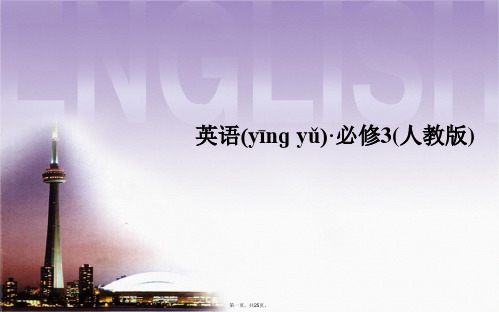
第十一页,共25页。
语法 精讲
Do you doubt that he will get there in time? 你怀疑他是否准时到达? I don't doubt that your answer is wrong. 我很肯定你的答案(dáàn)是错的。 He doubts whether/if I can do it. 他怀疑我能否应付得了。
第十五页,共25页。
语法
精讲
That's where_I_can't_agree_with_you. 那是我与你意见不同的地方。 This is why_she_was_late_for_the_meeting.
这是她开会迟到的原因。 This was how_they_overcame_the_difficulties. 他们就是这样克服困难的。 My strongest memory is
解析: 考查表语从句。考察 that引导表语从句的 用法。表语从句中that不可以(kěyǐ)省略。
第二十五页,共25页。
第四页,共25页。
语法
精 讲 一、宾语(bīnyǔ)从句
1.定义。 在复合句中充当动词或介词的宾语的句子就是宾语从句。 2.位置。 (1)位于及物动词(jíwùdònɡ cí)后。 I said that_I_would_go_home_immediately. 我说我要立即回家。
第五页,共25页。
第二十二页,共25页。
语法 精讲
例3Part of the reason Charles Dickens loved his own novel, David Copperfield , was________itthawt as rather closely modeled on his own life.
人教课标版高中英语必修3Unit4_Grammar_名师教学设计(一)
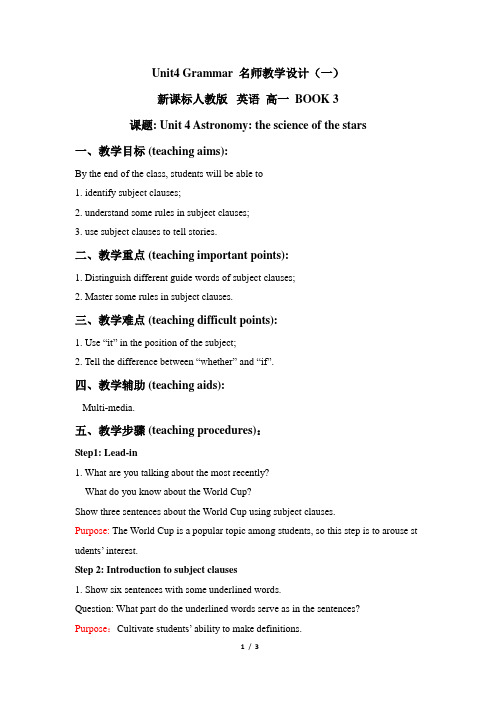
Unit4 Grammar 名师教学设计(一)新课标人教版英语高一 BOOK 3课题: Unit 4 Astronomy: the science of the stars一、教学目标 (teaching aims):By the end of the class, students will be able to1. identify subject clauses;2. understand some rules in subject clauses;3. use subject clauses to tell stories.二、教学重点 (teaching important points):1. Distinguish different guide words of subject clauses;2. Master some rules in subject clauses.三、教学难点 (teaching difficult points):1. Use “it” in the position of the subject;2. Tell the difference between “whether” and “if”.四、教学辅助 (teaching aids):Multi-media.五、教学步骤 (teaching procedures):Step1: Lead-in1. What are you talking about the most recently?What do you know about the World Cup?Show three sentences about the World Cup using subject clauses.Purpose: The World Cup is a popular topic among students, so this step is to arouse st udents’ interest.Step 2: Introduction to subject clauses1. Show six sentences with some underlined words.Question: What part do the underlined words serve as in the sentences? Purpose:Cultivate students’ ability to make definitions.2. Introduce guide words of subject clauses and some examples.(1) Conjunction: that, whether, if(2) Conjunctional pronoun: what, who, whom, which, whose, whatever, whoever, whi chever, whomever(3) Conjunctional adverb: when, where, how, whyPurpose:This is the key knowledge of this class, on which the final activity is based. Step 3: Some basic rules in subject clauses1. Show sentences with some words marked in red.2. Ask students to find the rules. (1) When a sentence is used as the subject, the verb is in singular form.Whatever he says is of no importance.Who will come to attend the meeting is not known.(2) When the subject clause is complete without anything missing, the conjunction “th at” can not be cut out.That our class is a united one is without question.That we finally won the match excited us a lot.(3) Subject clauses should be put in statement order.How he became a great scientist is known to all.Whether we will go to the park depends on the weather.Purpose: Let students find rules according to the marked parts in the sentences, which helps them memorize the important knowledge.Step 4: Music time1. Play an English song with some blanks for students to fill in.2. Explain two difficult points using two sentences in the song:(1) Use “it” in the position of the subject;(2) Tell the difference between “whether” and “if”.Purpose: Use an English song to make difficult grammar points more accessible to stu dents. Students will be more interested and will remember them more easily.Step 5: PracticeGet students to do four exercises about subject clause in class and give timely feedback. Purpose: Consolidate the knowledge students have just learned.Step 6: Story telling (group work)1. Show two cartoon pictures about the World Cup (drawn by two students). Students are divided into two parts, each chooses one picture. Then students talk about their pic ture in groups of six and form a story based on it. Each group member speaks out one sentence and finally there should be at least three subject clauses in a story.2. Some groups come to the platform to tell their stories.3. Other students listen carefully and try to figure out how many subject clauses in a st ory and what the guide words are.Purpose: 1. Create the contexts that students are familiar with for them to use what the y are taught to express their ideas.2. Teach students to listen to others, and identify subject clauses quickly.Step 7: Moral lessonThe true spirit of sports is teamwork, competition and friendship.Purpose: Teach students to learn to cooperate with others. Winning or losing is just a p art of competition; team spirit and friendship is more important.Homework:1. 完成课本“Discovering useful structures”部分的习题 ;2. 完成《新课程新练习》中“Grammar”部分。
- 1、下载文档前请自行甄别文档内容的完整性,平台不提供额外的编辑、内容补充、找答案等附加服务。
- 2、"仅部分预览"的文档,不可在线预览部分如存在完整性等问题,可反馈申请退款(可完整预览的文档不适用该条件!)。
- 3、如文档侵犯您的权益,请联系客服反馈,我们会尽快为您处理(人工客服工作时间:9:00-18:30)。
here
there
动词
come
go
练习-------将下列句子变为间接引语
1“I saw the tornado,”said the woman.
2 She said,“I’ll come again tomorrow.”
3 He said,“Did you see the film last night?”
8“I have already finished my homework,”Lily said.
9 The teacher asked her,“Why does she have so many strange questions?”
10 She said,“Are you busy?”
10’
34’
that week/ month
yesterday
the day before
last week
the week before
three days ago
three days before
tomorrow
the next day
the following day
next week
the next week
My father said to me,“I read the book in 1996.”
→My father told me that he read the book in 1996.
2 当直接引语表达的是客观真理,变为间接引语时时态可以不变
The geography teacher said to us,“The earth turns around the sun.”
e.g.“I am a student,”he said.→He said he was a student.
直接引语变间接引语时的几个变化
1 句式的变化
(1)陈述句变为以that引导的宾语从句
He said,“I’m very glad.”→He saidthathe was very glad.
3 时态的变化
直接引语的时态
间接引语的时态
一般现在时
一般过去时
现在进行时
过去进行时
一般将来时
过去将来时
一般过去时
过去完成时
现在完成时
过去完成时
过去完成时
过去完成时
e.g. He said,“I’m usingthe knife.”→He said that hewas usingthe knife.
→Thegeography teacher told us that the earthturnsaround the sun.
4 指示代词 时间状语 地点状语和动词的变化
直接引语
间接引语
指示代词
this
that
these
those
时间状语
now
then
today
that day
this week/ month
→Wei Fang told Wang Lin that she would help him with his maths.
“Areyougoing to see a film this evening?”Li Ping asked.
→Li Ping asked if (whether)Iwas going to see a film that evening.
课题
Period 4Grammar
课型
New
教学
目标
1.To enable Ss to know aboutThe past perfect passive;
2.To enable Ss to know aboutIndirect speech
重点
1.Know the basic forms of passive voice
2 人称的变化
直接引语
I
we
you
me
us
间接引语
He\she
they
I
him\her
them
e.g.“Doyoulike English?”he asked me.
→He asked me if (whether) I liked English.
“I’ll help you with your maths, Wang Lin,”Wei Fang said.
He said,“Where is Mr Wang?”→He askedwhereMr Wang was.
(4)祈使句变为“主语+谓语+宾语+宾补(动词不定式)”这一句型。常用于这种句型的动词有ask, order, tell, beg等
The teacher said,“Listen to me carefully.”→ The teacher told ustolisten to her carefully.
4 The doctor said,“Are you feeling better today?”
5“Which one do you like best?”he asked me.
6“Where did you spend your holiday this year?”he asked me.
7“Don’t take off your coat,”she said to her sister.
Zhou Lan said,“I’lldo my hmework after class.”
→Zhou Lan said that shewoulddo her homework after class.
提示:1当直接引语中的谓语动词为一般过去时时,如果与一个具体的表示过去时间的状语连用,变为间接引语时,时态可以不变。
(2)一般疑问句变成为if (whether)引导的宾语从句
He said,“Can you come this afternoon, John?”
→ He askedwhether(if) John could come that afternoon.
(3)特殊疑问句变为由who, what, when等疑问词引导的宾语从句(但注意从句中要变回陈述句. A projector 3. A computer
教法
explainingand practicing
教学程序
教学内容
师生
活动
时间分配
Step 1
Step 2
Step3
Step4
Step 1 Presentation: page 26
一字不改地引述别人的话叫做直接引语;用说话人自己的话转述别人的话叫间接引语。这两种引语都是宾语从句,但是直接引语放在引号内,不用连词连接;间接引语不用引号,通常用连接词与主句连接。
The teacher said,“Please sit down.”→ The teacher asked ustosit down.
“Don’t touch anything in the lab.”the teacher said to us.
→The teacher told usnot totouch anything in the lab.
1’
板
书
Period 4Grammar
直接引语的时态
间接引语的时态
一般现在时
一般过去时
现在进行时
过去进行时
一般将来时
过去将来时
一般过去时
过去完成时
现在完成时
过去完成时
过去完成时
过去完成时
教学后记
The Ss have some difficulties in understandingthe infinitive.
2.Help students to master grammar
难点
1.How to use the past perfect passive correctly
2.How to use grammatical items correctly
学情分析
The Ss can finish the task.
